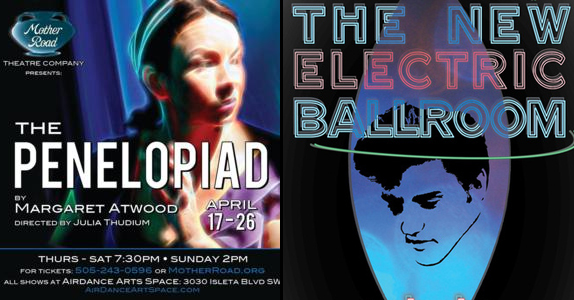
Two new Albuquerque theater productions, Mother Road's The Penelopiad and Fusion's The New Electric Ballroom, share a common theme: women who are overwhelmed because they are unable to cope with the demands that society and they themselves impose on their lives. What is more, the demands, and the failures, are due to the fact that they are women.
Aside from this theme, the two productions are about as different as is imaginable, once again reflecting the startling diversity of our small regional theater companies.
The Penelopiad is an ambitious multidimensional drama, combining a book by famed novelist Margaret Atwood with original music, songs and dance, including air work on drapes suspended from the ceiling. It retells the story of Odysseus. But as opposed to Homer's focus on the Greek soldier, adventurer and wise man, it is told from the perspective and through the voice of Penelope, the young wife he leaves behind for many years to run his estate and his kingdom. Wendy Scott, who does a magnificent job as the besieged and struggling wife of the absent Odysseus, is on stage constantly, and her narrative is the lynchpin of the story.
A young, agile and dramatic chorus of about a dozen women back her up. In this all-female cast, the women play both male and female roles, something I have never seen before. In Shakespeare the female roles were originally played by boys. And an all-male Duke City company called The Dolls performs as women. But the reverse is highly unusual.
In the context of giving a modern and feminist twist to an ancient and thoroughly masculine epic, the reversal works, forcing the audience to reevaluate how they see gender behavior.
Much credit for the success of the show goes to Julia Thudium, the prime mover of Mother Road and director of the production. Original music by Sid Fendley and choreography by Debra Landau add invaluable elements to the show.
Collaborating with Mother Road in the production is Air Dance, which has a large and wonderfully flexible and evocative space that makes the acrobatics as well as the moody and shadowy narrative possible.
The Penelopiad continues Thursday through Saturday at 7:30 p.m. and closes with a 2 p.m. performance Sunday, April 26. Performances at Air Dance are at 3030 Isleta Blvd. SW in Albuquerque. For tickets and information call 243-0596 or go to motherroad.org.
Fusion's The New Elecdtric Ballroom is an entirely different kind of show. Written by the brilliant young Irish playwright Enda Walsh, it is a profoundly sad story of three sisters each of whom has one, and only one, chance for life and love, and each of whom fails to grasp the ring. The sisters, played convincingly by the experienced cast of Jacqueline Reid, Laurie Thomas and Nancy Jeris, live inside their house and isolated from the rest of their small Irish town. Their only social contact is with a fish seller, an odd and rather disreputable local character played with power and eloquence by Bruce Holmes.
The power of Walsh's writing, which is some of the best in contemporary theater, is the strength of the play, but also its problem. The story develops less through interaction among the characters than in rather long speeches that each delivers directly to the audience in a rapid fire, almost trancelike Irish brogue. The way the speeches are delivered deprives them of the body language and contextual cues that could help explicate them. In addition, director Gil Lazier's decision to have the actors speak the dense, elaborate prose rapidly, with Irish accents makes much of the dialogue difficult to comprehend.
When I was on my way out of the theater, producer Dennis Gromelski handed me a copy of the book containing the script, the first time I have ever received such a gift at a theater. I was glad he did, for I found the words on the page had an emotional depth that eluded me on the stage. Walsh is just too fine a writer for his own good. Many critics, and Gromelski in his introduction, described him as a wordsmith. Although accurate, the term is one I dislike for it suggests that a writer's technical virtuosity is something separate from, and more important than, the story and the message he is delivering.
The New Electric Ballroom continues at the Cell, 700 First ST. NW in Albuquerque through April 24 (including a highly unusual Wednesday performance) followed by a pay-what-you-will night at the KiMo. The show then moves to Santa Fe and concludes in Las Cruces. For tickets and information call 766-9412 or go to liveatthecell.com.



Responses to “When Women are Overwhelmed”